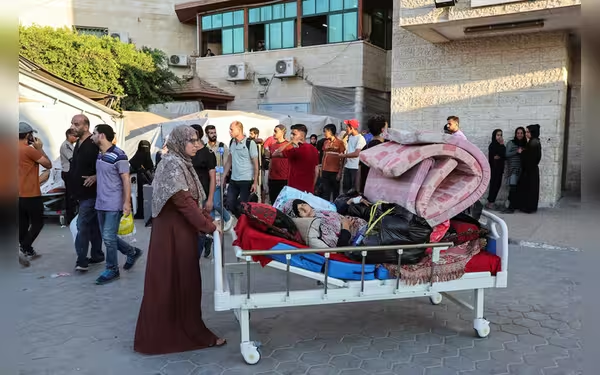Saturday, November 16, 2024 05:37 PM
UN Inquiry Accuses Israel of Extermination in Gaza Health Crisis
- UN inquiry claims Israel's actions amount to war crimes.
- Health system collapse severely impacts Gaza's children.
- Over 10,000 patients unable to evacuate for urgent care.
 Image Credits: arabnewspk
Image Credits: arabnewspkUN inquiry accuses Israel of war crimes in Gaza, highlighting the devastating impact on the health system and vulnerable populations.
In a significant development, a United Nations inquiry has accused Israel of engaging in a systematic campaign to destroy the health care system in Gaza during the recent conflict. This inquiry, led by former UN High Commissioner for Human Rights Navi Pillay, claims that these actions amount to war crimes and even the crime against humanity of extermination. The report highlights the dire consequences of the conflict, particularly for the vulnerable population of Gaza, especially children.
The conflict escalated following a deadly attack by Hamas militants on southern Israel on October 7, 2023. In response, Israel has conducted military operations in Gaza, which the UN inquiry describes as “relentless and deliberate attacks on medical personnel and facilities.” Pillay emphasized that the health system's collapse has had devastating effects on children, who are suffering both directly from the violence and indirectly due to the lack of medical care.
Israel, on the other hand, argues that its military actions are necessary to target Hamas militants who operate from densely populated areas, including homes, schools, and hospitals. The Israeli government maintains that it aims to minimize civilian casualties while conducting its operations. However, Hamas has denied allegations of using civilians as shields for their military activities.
The UN inquiry's findings are alarming. It accuses Israeli forces of deliberately killing and torturing medical personnel, attacking medical vehicles, and restricting permits for patients needing urgent medical care. A tragic example cited in the report is the death of a Palestinian girl, Hind Rajab, who was killed along with her family and two medics while they attempted to rescue her under Israeli fire.
The World Health Organization (WHO) has reported that over 10,000 patients requiring urgent medical evacuation have been unable to leave Gaza since the Rafah border crossing with Egypt was closed in May. Additionally, the Palestinian health ministry has stated that nearly 1,000 medics have lost their lives in Gaza over the past year, which the WHO described as “an irreplaceable loss and a massive blow to the health system.”
The inquiry also examined the treatment of Palestinian detainees in Israel and hostages taken by Hamas during the October 7 attack, accusing both parties of engaging in torture and sexual violence. The Commission of Inquiry (COI) has a broad mandate to gather evidence and identify those responsible for international crimes in Israel and the occupied Palestinian territories. Its findings are based on various sources, including interviews with victims, witness testimonies, and satellite imagery.
Previously, the COI has alleged that both Israel and Hamas committed war crimes during the early stages of the Gaza conflict. It has also stated that Israel's actions could be classified as crimes against humanity due to the significant civilian casualties involved. Such serious allegations highlight the gravity of the situation and the urgent need for accountability.
Israel has rejected the inquiry's findings, claiming that it is biased against the country. The Israeli government has accused the COI of obstructing its work and preventing investigators from accessing both Israel and the Palestinian territories. This lack of cooperation raises concerns about the transparency and effectiveness of the inquiry.
As the situation continues to unfold, the implications of these findings are profound. The evidence gathered by UN-mandated bodies often serves as a foundation for war crimes prosecutions and could be utilized by the International Criminal Court in the future. The ongoing conflict in Gaza not only affects the immediate health and safety of its residents but also poses significant challenges for international law and human rights. It is crucial for the global community to pay attention to these developments and advocate for the protection of civilians in conflict zones.













